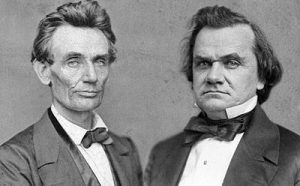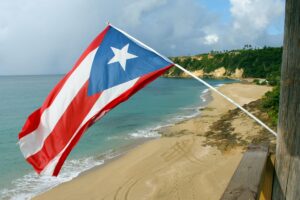“In 1492, Columbus sailed the ocean blue.” Christopher Columbus is one of the first people we learn about in elementary school, and the discovery of the “New World” is accredited to him. One might think that he knew that he had accomplished a great feat, but in reality he did not accomplish what he had originally set out to do.
Christopher Columbus was born in 1451 in Genoa, Italy, to Domenico Colombo and Susanna Fontanarossa. His fascination with sailing began with the Portuguese merchant marine. Shortly after surviving a shipwreck off the coast of Portugal on his first voyage in 1476, he based himself in Lisbon.1 He sailed again in 1477 and 1478, and married in 1479. From 1477 to 1485, Columbus traded along the Guinea and Gold coasts of West Africa, where he started gaining knowledge of Portuguese navigation and the Atlantic wind systems. It was during this time that Columbus came to the conclusion that sailing west would eventually lead him to the east coast of Asia.2 After bringing his idea to the Portuguese King in 1485 and again in 1488, and being rejected, he took his idea to Genoa. Rejected yet again, he then headed to Venice in search of funding. Hit by rejection once more, he took his plans to Spain in 1486, to King Ferdinand of Aragon and Queen Isabella of Castile, where he was rejected for the fourth time.3

In January of 1492, in hopes of being able to gain more strength than Portugal, and hopes of spreading the Christian mission, King Ferdinand II and Queen Isabella I decided to fund Columbus. In August of 1492 Columbus sailed out from the Spanish port of Palos on the now-famous ships Nina, Pinta, and Santa Maria.
Besides trying to reach east Asia, Columbus was intent on sailing west until he reached the Indies, where he believed riches of gold, pearls, and spice awaited.4 At the time, it was extremely difficult to access the sea route south from the Red Sea because of the Islamic powers in the Indian Ocean, and the increasing power of the Ottoman Empire was threatening the power of the Christian monarchies in Europe.5 In a letter before his journey Columbus wrote that he believed he would be able to conquer the infidel, gain victory for Christianity, and gain the westward route to discovery and Christian alliance. Being a religious man, Columbus was set on supplying funds to recapture Jerusalem from the Muslims, which matched up with the Christian crusade ideas.6

Columbus then continued to make three more trips. He made a second trip in 1493, a third voyage in 1498, and his fourth and final voyage was in 1502. All of these trips were sponsored by Spain.7
Given the title Admiral of the Ocean Seas by Spain’s monarchs, and still thinking he had sailed to Asia, Columbus died never knowing what he had discovered and created. Now, however, everyone knows that his discovery was one of the most significant in history.
- Encyclopedia Britannica, January 2016, s.v. “Christopher Columbus,” by Valerie Flint. ↵
- Funk & Wagnalls New World Encyclopedia, 2016, s.v. “Columbus, Christopher.” ↵
- Alphonse de Lamartine, The Life and Times of Christopher Columbus (Toronto: Sutherlands, 1887), 13-26. ↵
- Anam Haider, “Discovery of America by Columbus on 12th October 1492,” Discovery, Volume 2, Number 4, (October 2012): 3. ↵
- Encyclopedia Britannica, January 2016, s.v. “Christopher Columbus,” by Valerie Flint. ↵
- Delno C. West, “Christopher Columbus, lost biblical sites, and the last crusade,” Catholic Historical Review no. 4 (1992): 519. ↵
- Encyclopedia Britannica, January 2016, s.v. “Christopher Columbus,” by Valerie Flint. ↵


41 comments
Jesus Parker
It is crazy how an accident such as this impacted the whole world. The Americas were eventually going to be discovered but who knows how long that would have taken if Christopher never set sail looking for a different route to India. The effect of the discovery of America caused a massive effect of the Natives that lived in the Americas though and caused them to be nearly wiped out due to diseases.
Juan Arceo
It is kinda funny to me how, with what I have been taught in school and this article, that Christopher Columbus still gets all the recognition of the world with his “accidental discovery” of the New World. Sure it was the beginning of new explorations and all the trips and basically the start of something new, but even with all that, his actions towards the original founders of this so-called “New World”, the Native Americans, is atrocious and to go to the extent and celebrate a day for his actions, is questionable.
Emmanuel Ewuzie
The “discovery” of the New World changed everything and was a giant boost to the effort of globalization as Christopher had just established a link between the Old World and New World. Thanks to his efforts, colonizers and missionaries were able to spread Christianity by sometime brute force throughout the Americas enlightening numerous individuals
Makenzie Santana
I think this article was a little too summed up to read, there could have been so much more information covered on this story but it felt like reading a timeline instead of a story. I would have liked to learn more about his accidental discovery instead of reading about everything that happened before breifly and then there being a few short sentences about him not knowing what he had found.
Hali Garcia
Great article! I have always found it interesting about how he found something completely different from what he was originally looking for. His main goal was to find a route to India but in that he was unsuccessful. I find it funny that he does get all the attention for discovering the New World but he was not the first to discover it.
Maya Mani
It’s interesting how Columbus happened to make it to the right place at the right time, even though his intentions were very different. Though it was an accident, and didn’t know of the significance of his actions, they were still significant anyways. Interesting article because I also got to know about his overall journey, it seems like he just kept travelling over and over again.
Engelbert Madrid
Although Christopher Columbus is credited as the explorer who discovered the “New World”, which is now known as the Americas, the Natives are actually the ones who must be credited for discovering this world. Christopher Columbus only helped Europeans to invade the Natives territory in order to sell and trade their land’s property. Although Columbus did an amazing discovery of Hispaniola, it is tragic that many American natives were killed and suffered because of Columbus’ great discover for Europeans.
Joshua Garza
Christopher Columbus really had no idea what he did for the world by discovering the Americas. He changed the worlds of two different types of civilizations as far as culture, religion, disease, war, and life itself with all the other good and bad things that come with combining cultures. But if he had not done that at the time that he did, imagine how technologically far behind we would be if someone had waited to do this.
Mia Stahl
In the spirit of Columbus day being near, I think it is appropriate to point out that although this was one of the greatest discoveries for the white man it was one of the worst for the Native Americans. It is also scarcely known that the Native Americans are known as Indians because when Columbus landed in the New World he thought he had landed in India, therefore we have been calling Native Americans by the name that a mistaken white man gave to them.
Mariah Cavanaugh
Given what I know about Columbus, and backed up by this article to some extent, it seems a shame that he gets the credit that he does for discovery the New World. He wasn’t the first here, nor was he even the one who truly knew what he discovered. He deserves credit for his determination and for using that to push Spain to fund his trip, but beyond that it seemed he was driven to conquer for money or people in the name of his religion and that is exactly what he did. He just did it in the wrong place, or at least not the place he intended.